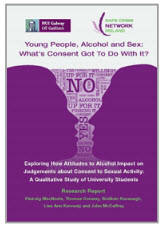Mongan, Deirdre (2014) How attitudes to alcohol affect judgements about sexual behaviour. Drugnet Ireland, Issue 50, Summer 2014, pp. 18-19.
| Preview | Title | Contact |
|---|---|---|
|
PDF (Drugnet issue 50)
2MB |
The Rape Crisis Network Ireland commissioned NUI Galway to undertake a qualitative study to explore university students’ attitudes to alcohol use and consent to engage in sexual activity1 and to build on previous Irish research,2 which demonstrated a high rate of co-occurrence of rape and heavy drinking by perpetrators and/or victims. A total of 187 young adults in an Irish university took part in the study; four focus groups were held with 24 females, three focus groups were held with 20 males, and an online survey using open-ended questions was completed by 143 students.

The context for consent – alcohol’s role in student life
Analysis of the focus groups’ data revealed that alcohol plays a key role in students’ social interactions. It acts as an icebreaker, gives confidence, helps to overcome shyness, and helps students to form friendships. Drinking is the norm and students fear exclusion from their peer group if they do not join in and drink. Regarding sexuality, alcohol is perceived by students to be an enabler, which helps them to approach a person of the opposite sex. Alcohol provides ‘Dutch courage’ and is often the main reason that a couple get together.
Consent to sex: reading implicit signs
Consenting to sex was described as being largely implicit; consent is usually given through non-verbal signs, rather than verbally. In general, males increase the extent of physical intimacy until the female indicates that she wants the male to stop. Hook-up encounters present problems regarding consent as the two individuals have not built up any trust with each other. In these circumstances, body language and flirting were considered to indicate consent. One of the male focus groups stated that ‘most lads will know if she’s up for it’, and if a partner agreed to leave the nightclub with you, this could be interpreted as a clear sign of interest in sex.
Alcohol had an impact on both the provision and understanding of consent. Providing consent if one or both of the partners were drunk was difficult, especially during hook-up encounters, which were more likely to occur when alcohol was consumed. The students stated that in these situations alcohol made it more likely that consent would be assumed rather than being explicitly provided verbally. A problematic issue was determining if one partner was drunk beyond the point of giving consent. The threshold the students identified for being unable to give consent could be considered as high. Males said that a female was able to give consent ‘as long as she could talk’. However, if one partner was a lot drunker than the other, the less drunk person could be at risk of ‘taking advantage’ of the other person. It was considered wrong to have sex with someone whose ability to provide consent was less effective than your own.
Alcohol and sexual assault
Both male and female focus group participants clearly believe that sexual assault is wrong and that it has serious and long-lasting consequences for victims. There was consensus that it is important not to blame the victim when sexual assaults occur. Alcohol plays an important role in sexual assaults; it lowers inhibitions, which in turn leads to loss of control; it can cause males to lose their ability to regulate their drive for sex; it can make women lose their ability to refuse sex; and it can remove a victim’s ability to report what has happened. There was also a belief that alcohol consumption can undermine a victim’s credibility when it comes to reporting a rape or assault.
Analysis of the online survey found that the responses were consistent with those made by focus group participants.
Conclusions
The authors recommend supporting ‘systematic, communication-based approaches’, to change current attitudes to alcohol and non-consenting sexual activity, and they state that approaches are required to enable young people to understand the meaning of consent. They conclude that ‘young people should be regarded as partners to health professionals, peer educators, and others in achieving change in the status quo. The use of active, stimulating methods of engagement should help youth move from principles to practice in their critical thinking about consent’.
1. MacNeela P, Conway T, Kavanagh S et al. (2014) Young people, alcohol and sex: what's consent got to do with it? Exploring how attitudes to alcohol impact on judgements about consent to sexual activity: a qualitative study of university students. Galway: Rape Crisis Network Ireland. www.drugsandalcohol.ie/21286
2. Hanly C, Healy D and Scriver S (2009) Rape and justice In Ireland: a national study of survivor, prosecutor and court responses to rape. Dublin: The Liffey Press. www.rcni.ie/wp-content/uploads/Exec-Summary.pdf
F Concepts in psychology > Cognition / Memory
F Concepts in psychology > Attitude > Attitude toward substance use
F Concepts in psychology > Behaviour > Risk-taking behaviour
J Health care, prevention, harm reduction and treatment > Health related issues > Health information and education > Communicable / infectious disease control > Safe sex / sexual health
VA Geographic area > Europe > Ireland
Repository Staff Only: item control page